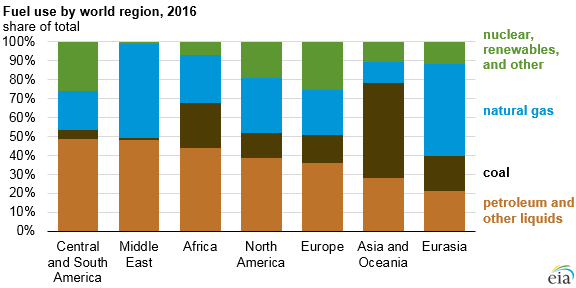Energy consumption in Asia, the Middle East, and Africa is grow rapidly, with about 20% growth in each region between 2010 and 2016, according to data in EIA’s International Energy Statistics database.
Specifically, energy consumption has been rising in the Middle East and Africa, driven by economic growth, increased access to energy markets, and growing populations. Moreover, energy consumption in Asia increased even as energy consumption in China reduced between 2015 and 2016.
[smlsubform prepend=”GET THE SAFETY4SEA IN YOUR INBOX!” showname=false emailtxt=”” emailholder=”Enter your email address” showsubmit=true submittxt=”Submit” jsthanks=false thankyou=”Thank you for subscribing to our mailing list”]
In addition, EIA said that growth was quick in Africa and the Middle East, Asia and Oceania consumed much more energy overall. In addition, slower long-term energy consumption trends continued in North America, where energy consumption grew by 1% between 2010 and 2016, and in Europe, where energy consumption fell 4% between those years.
Furthermore, petroleum and other liquid fuels are the main form of energy consumed. Increased use of these fuels has been supported by increasing supplies of US shale oil and other international sources of liquid fuels that have kept prices competitive. What is more, coal consumption continued to decline as a result of competition from low cost natural gas.
In 2016, coal accounted for almost 50% of the energy consumed in Asia and Oceania, where China, India, and Australia are key consumers of coal. The largest shares of nuclear and renewable energy were located in Europe (26%), North America (19%), and Central and South America (26%).
Moreover, from 2000 to 2013, China grew its energy consumption, surpassing the US as the world’s largest energy consumer in 2009. Since 2013, China has been using about 40% more energy than the US.
As for India, its GDP is growing 8% per year, and energy use is growing as well. Recently, India has overtaken Japan, Canada, and Germany in energy consumed and is likely to surpass Russia.


































































